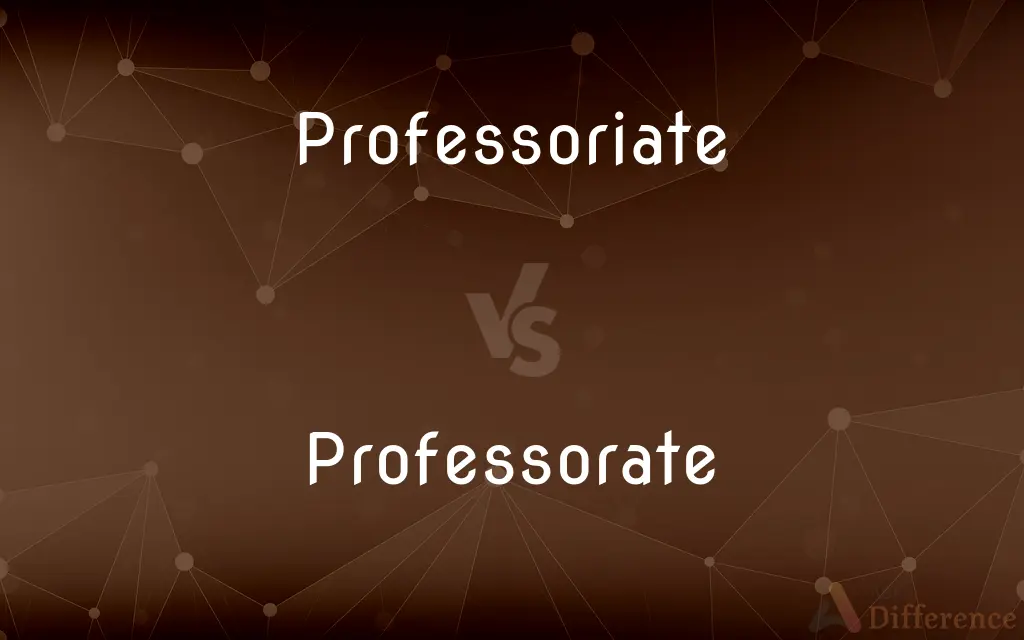Professoriate vs. Professorate — What's the Difference?
By Tayyaba Rehman & Urooj Arif — Updated on April 4, 2024
The professoriate refers to the collective body of professors within an institution, emphasizing their role and community, while professorate denotes the position or office of a professor.

Difference Between Professoriate and Professorate
Table of Contents
ADVERTISEMENT
Key Differences
The professoriate encompasses the entire community of professors at an educational institution, highlighting their collective academic and professional standing. In contrast, the professorate refers specifically to the role or status one holds as a professor, focusing on the individual's appointment to an academic position.
Membership in the professoriate signifies belonging to the broader academic community, underscoring a collective identity among scholars. Whereas holding a professorate underlines an individual's achievement and recognition in the academic field, emphasizing the singular position rather than the collective.
The concept of the professoriate often involves aspects of governance, peer collaboration, and the shared responsibilities of academic staff within an institution. On the other hand, the professorate focuses on the duties, rights, and obligations tied to being a professor, such as teaching, research, and service.
Discussions about the professoriate can lead to considerations of academic freedom, tenure, and the roles professors play in shaping educational policies. Meanwhile, discussions about the professorate typically revolve around the qualifications, appointments, and career trajectory of an individual professor.
The term professoriate can also imply a level of solidarity and collective action among professors, especially in matters of academic governance and policy-making. In contrast, the professorate highlights the prestigious nature of achieving such a rank within the academic hierarchy, focusing on personal accomplishment.
ADVERTISEMENT
Comparison Chart
Definition
Collective body of professors in an institution
The position or office of a professor
Emphasis
Community and collective identity
Individual role and status
Scope
Broad, involving governance and collaboration
Focused on individual duties and rights
Implications
Reflects on collective academic freedom and responsibilities
Centers on qualifications and achievements of individuals
Associations
Solidarity, academic governance
Prestige, career advancement
Compare with Definitions
Professoriate
Involved in governance.
Members of the professoriate serve on key committees.
Professorate
Involves teaching and research.
The professorate requires a balance of teaching and scholarship.
Professoriate
Advocates for educational policies.
The professoriate played a crucial role in reforming the tenure process.
Professorate
Denotes an academic rank.
Holding a professorate is a sign of academic distinction.
Professoriate
Represents academic staff unity.
The professoriate issued a statement on academic freedom.
Professorate
The position of a professor.
She achieved the professorate after years of research.
Professoriate
A collective body of professors.
The professoriate debated the new university policy.
Professorate
Associated with tenure.
The professorate often comes with the pursuit of tenure.
Professoriate
Shares responsibilities in academia.
The professoriate contributes to curriculum development.
Professorate
Reflects individual achievement.
His appointment to the professorate was celebrated by colleagues.
Professoriate
The rank or office of a professor.
Professorate
The rank, office, or term of office of a professor.
Professoriate
College or university professors considered as a group.
Professorate
Professorship
Professoriate
Professors considered as a group or body.
Professoriate
(dated) The office of a professor.
Professoriate
The body of professors, or the professorial staff, in a university or college.
Professoriate
A professorship.
Common Curiosities
What is the professoriate?
The professoriate refers to the collective body of professors at an educational institution.
How does the concept of the professoriate impact academic freedom?
The professoriate supports academic freedom by fostering a collective environment where scholars can freely exchange ideas and engage in research without external pressures.
What does professorate mean?
The professorate denotes the position or office of a professor.
How does the professoriate differ from the professorate in terms of community?
The professoriate emphasizes a collective academic community, whereas the professorate focuses on individual roles within academia.
Can someone be part of the professoriate without holding a professorate?
Typically, the terms are interrelated; holding a professorate makes one part of the professoriate, though the reverse focuses on collective versus individual status.
What role does the professoriate play in the tenure process?
The professoriate plays a critical role in the tenure process, often serving on review committees and contributing to the evaluation of tenure candidates based on scholarly merit and professional contributions.
Does the professorate come with specific obligations beyond teaching and research?
Yes, the professorate often involves service obligations such as committee work, mentorship, and engagement in community and professional organizations.
How is the concept of the professoriate viewed in different countries or educational systems?
The concept of the professoriate can vary globally, reflecting different academic traditions, governance structures, and roles in higher education, but it generally denotes a community of scholars with shared responsibilities and governance roles.
Can the professoriate include adjunct or part-time professors?
While traditionally focused on full-time, tenured or tenure-track faculty, discussions about the inclusivity of the professoriate are evolving to consider the roles and contributions of adjunct and part-time professors.
What qualifications are typically required for someone to achieve a professorate?
Achieving a professorate usually requires a doctoral degree, significant scholarly contributions, teaching excellence, and recognition in one's field.
How does one's participation in the professoriate change after achieving tenure?
After achieving tenure, a professor's participation in the professoriate may deepen, with increased involvement in governance, mentorship, and shaping the academic direction of the institution.
What challenges can arise within the professoriate regarding academic governance?
Challenges within the professoriate regarding academic governance can include disagreements over policy, the balance between administrative and academic control, and the representation of diverse academic disciplines and perspectives.
In what ways can the professoriate influence educational policy?
The professoriate can influence educational policy through collective advocacy, serving on committees, and participating in governance structures that shape academic standards and practices.
How does the professorate influence the academic and professional development of junior faculty?
Members of the professorate influence the development of junior faculty through mentorship, collaborative research opportunities, and guidance in navigating the complexities of academic careers and the tenure process.
Share Your Discovery

Previous Comparison
Probe vs. Sensor
Next Comparison
Overt vs. ManifestAuthor Spotlight
Written by
Tayyaba RehmanTayyaba Rehman is a distinguished writer, currently serving as a primary contributor to askdifference.com. As a researcher in semantics and etymology, Tayyaba's passion for the complexity of languages and their distinctions has found a perfect home on the platform. Tayyaba delves into the intricacies of language, distinguishing between commonly confused words and phrases, thereby providing clarity for readers worldwide.
Co-written by
Urooj ArifUrooj is a skilled content writer at Ask Difference, known for her exceptional ability to simplify complex topics into engaging and informative content. With a passion for research and a flair for clear, concise writing, she consistently delivers articles that resonate with our diverse audience.














































